Analyzing Causation and Effectuation in New Venture Creation Process
VerifiedAdded on 2023/06/13
|7
|1959
|142
Essay
AI Summary
This essay provides a comparative analysis of causation and effectuation in entrepreneurship, highlighting the contrasting approaches entrepreneurs take in setting goals and utilizing resources. Causation focuses on predefined goals and strategic decisions to achieve specific targets, while effectuation emphasizes leveraging available resources to explore potential outcomes. The essay discusses the limitations of traditional textbook theories that prioritize goal-setting without considering available resources, particularly in the context of new venture creation. It also explores the principles of effectuation, emphasizing innovation, contingency management, and the role of entrepreneurial experience in decision-making under uncertainty. The report concludes that a balanced approach, integrating both causation and effectuation, is essential for organizations to effectively manage their goals and adapt to changing opportunities.
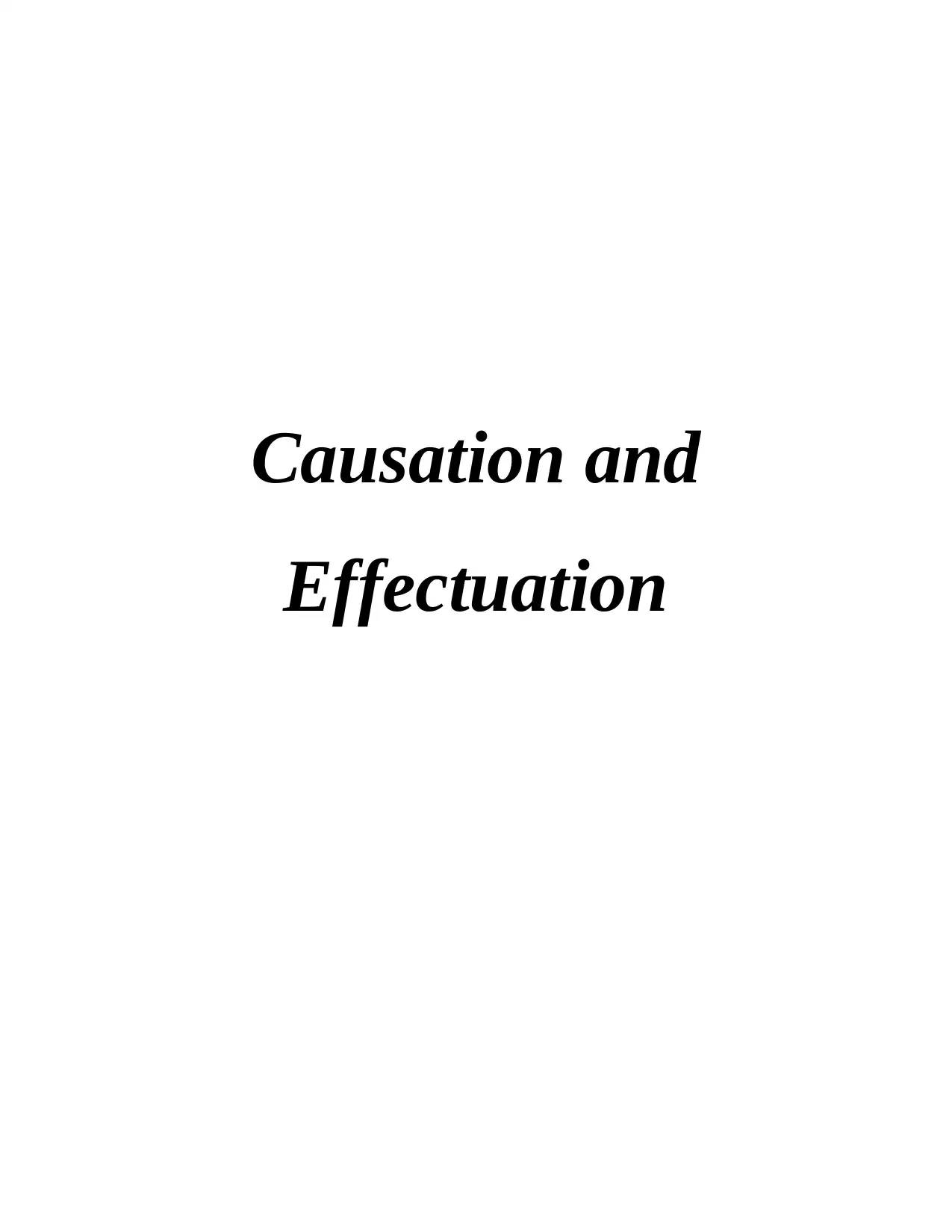
Causation and
Effectuation
Effectuation
Paraphrase This Document
Need a fresh take? Get an instant paraphrase of this document with our AI Paraphraser

Table of Contents
INTRODUCTION ..........................................................................................................................3
TASK ..............................................................................................................................................3
CONCLUSION ...............................................................................................................................6
REFERENCES................................................................................................................................7
INTRODUCTION ..........................................................................................................................3
TASK ..............................................................................................................................................3
CONCLUSION ...............................................................................................................................6
REFERENCES................................................................................................................................7
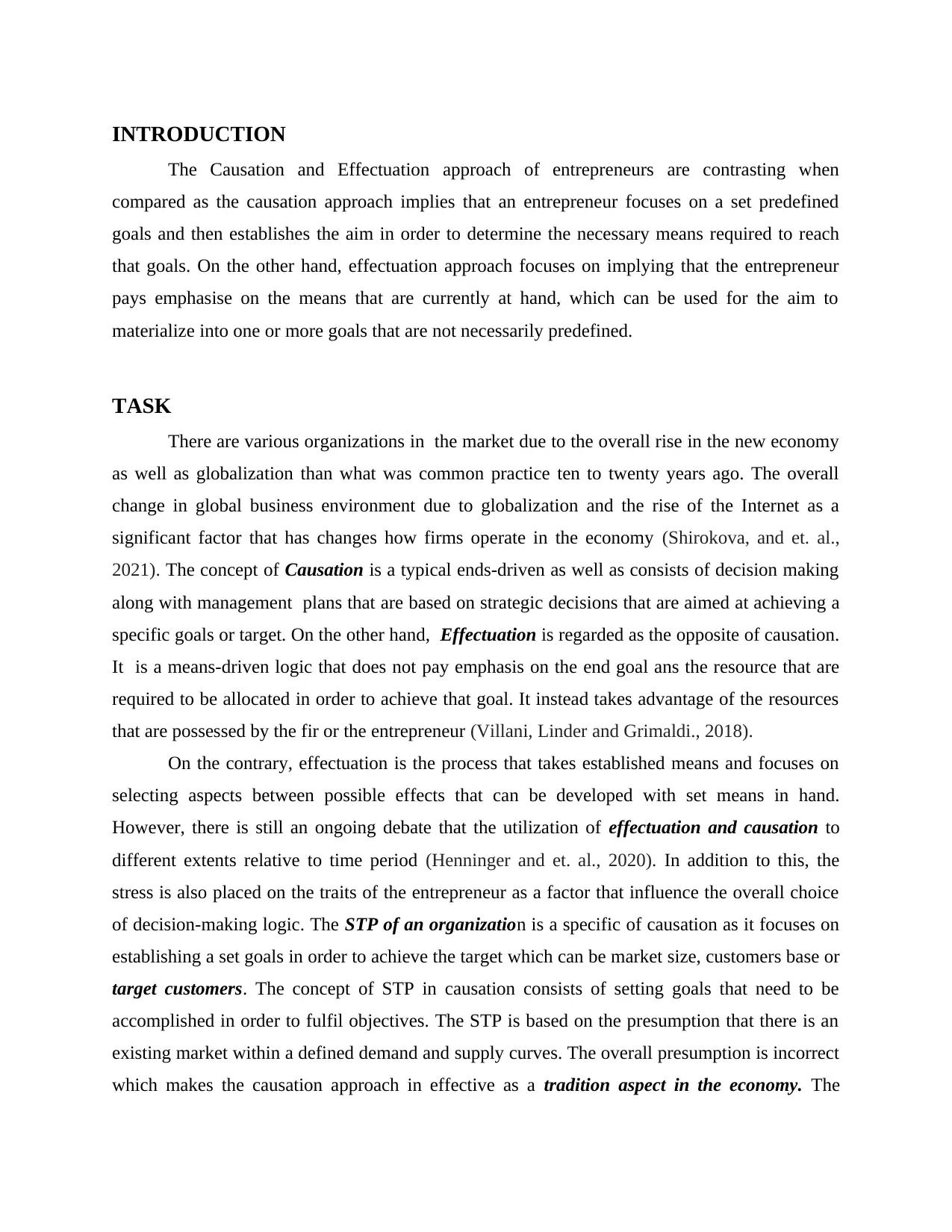
INTRODUCTION
The Causation and Effectuation approach of entrepreneurs are contrasting when
compared as the causation approach implies that an entrepreneur focuses on a set predefined
goals and then establishes the aim in order to determine the necessary means required to reach
that goals. On the other hand, effectuation approach focuses on implying that the entrepreneur
pays emphasise on the means that are currently at hand, which can be used for the aim to
materialize into one or more goals that are not necessarily predefined.
TASK
There are various organizations in the market due to the overall rise in the new economy
as well as globalization than what was common practice ten to twenty years ago. The overall
change in global business environment due to globalization and the rise of the Internet as a
significant factor that has changes how firms operate in the economy (Shirokova, and et. al.,
2021). The concept of Causation is a typical ends-driven as well as consists of decision making
along with management plans that are based on strategic decisions that are aimed at achieving a
specific goals or target. On the other hand, Effectuation is regarded as the opposite of causation.
It is a means-driven logic that does not pay emphasis on the end goal ans the resource that are
required to be allocated in order to achieve that goal. It instead takes advantage of the resources
that are possessed by the fir or the entrepreneur (Villani, Linder and Grimaldi., 2018).
On the contrary, effectuation is the process that takes established means and focuses on
selecting aspects between possible effects that can be developed with set means in hand.
However, there is still an ongoing debate that the utilization of effectuation and causation to
different extents relative to time period (Henninger and et. al., 2020). In addition to this, the
stress is also placed on the traits of the entrepreneur as a factor that influence the overall choice
of decision-making logic. The STP of an organization is a specific of causation as it focuses on
establishing a set goals in order to achieve the target which can be market size, customers base or
target customers. The concept of STP in causation consists of setting goals that need to be
accomplished in order to fulfil objectives. The STP is based on the presumption that there is an
existing market within a defined demand and supply curves. The overall presumption is incorrect
which makes the causation approach in effective as a tradition aspect in the economy. The
The Causation and Effectuation approach of entrepreneurs are contrasting when
compared as the causation approach implies that an entrepreneur focuses on a set predefined
goals and then establishes the aim in order to determine the necessary means required to reach
that goals. On the other hand, effectuation approach focuses on implying that the entrepreneur
pays emphasise on the means that are currently at hand, which can be used for the aim to
materialize into one or more goals that are not necessarily predefined.
TASK
There are various organizations in the market due to the overall rise in the new economy
as well as globalization than what was common practice ten to twenty years ago. The overall
change in global business environment due to globalization and the rise of the Internet as a
significant factor that has changes how firms operate in the economy (Shirokova, and et. al.,
2021). The concept of Causation is a typical ends-driven as well as consists of decision making
along with management plans that are based on strategic decisions that are aimed at achieving a
specific goals or target. On the other hand, Effectuation is regarded as the opposite of causation.
It is a means-driven logic that does not pay emphasis on the end goal ans the resource that are
required to be allocated in order to achieve that goal. It instead takes advantage of the resources
that are possessed by the fir or the entrepreneur (Villani, Linder and Grimaldi., 2018).
On the contrary, effectuation is the process that takes established means and focuses on
selecting aspects between possible effects that can be developed with set means in hand.
However, there is still an ongoing debate that the utilization of effectuation and causation to
different extents relative to time period (Henninger and et. al., 2020). In addition to this, the
stress is also placed on the traits of the entrepreneur as a factor that influence the overall choice
of decision-making logic. The STP of an organization is a specific of causation as it focuses on
establishing a set goals in order to achieve the target which can be market size, customers base or
target customers. The concept of STP in causation consists of setting goals that need to be
accomplished in order to fulfil objectives. The STP is based on the presumption that there is an
existing market within a defined demand and supply curves. The overall presumption is incorrect
which makes the causation approach in effective as a tradition aspect in the economy. The
⊘ This is a preview!⊘
Do you want full access?
Subscribe today to unlock all pages.

Trusted by 1+ million students worldwide
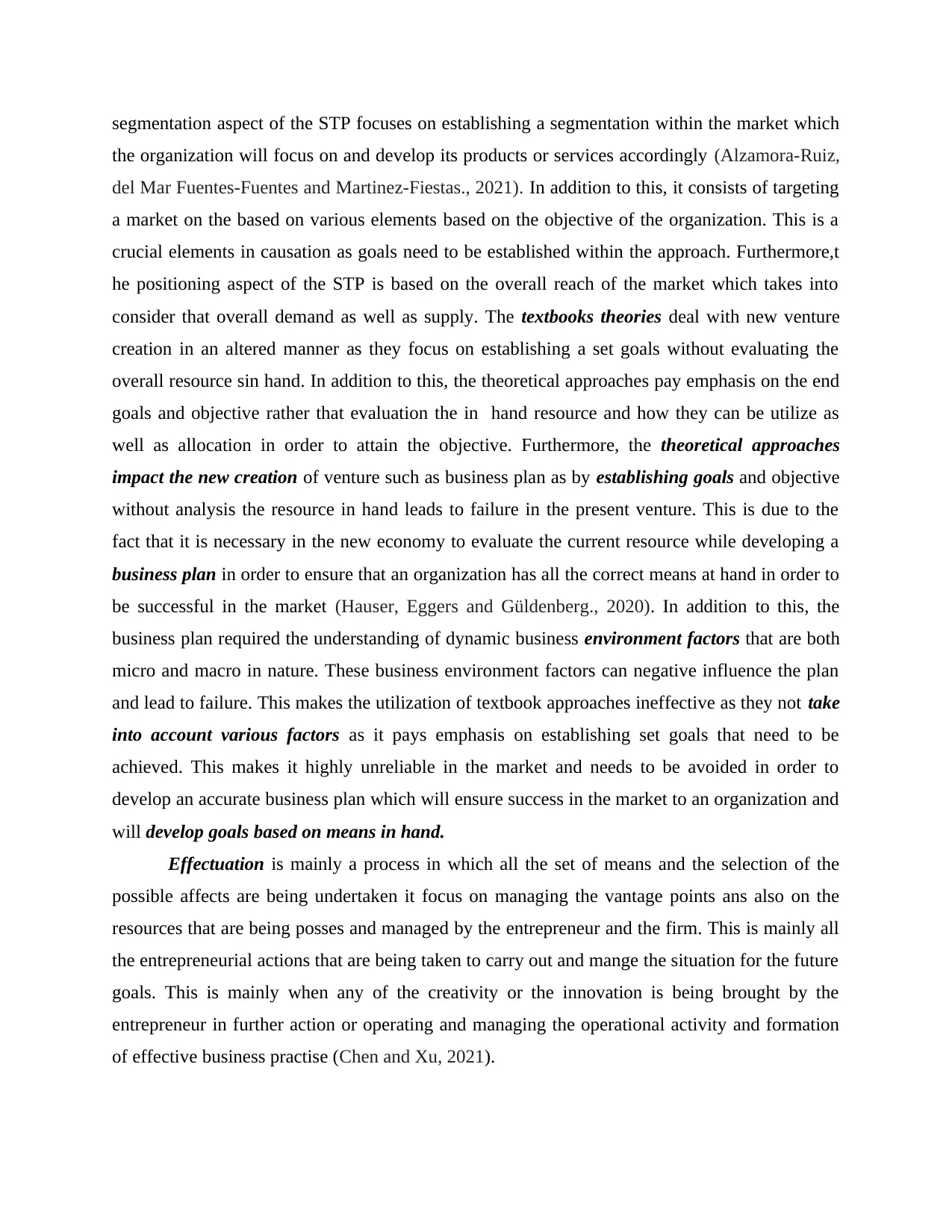
segmentation aspect of the STP focuses on establishing a segmentation within the market which
the organization will focus on and develop its products or services accordingly (Alzamora-Ruiz,
del Mar Fuentes-Fuentes and Martinez-Fiestas., 2021). In addition to this, it consists of targeting
a market on the based on various elements based on the objective of the organization. This is a
crucial elements in causation as goals need to be established within the approach. Furthermore,t
he positioning aspect of the STP is based on the overall reach of the market which takes into
consider that overall demand as well as supply. The textbooks theories deal with new venture
creation in an altered manner as they focus on establishing a set goals without evaluating the
overall resource sin hand. In addition to this, the theoretical approaches pay emphasis on the end
goals and objective rather that evaluation the in hand resource and how they can be utilize as
well as allocation in order to attain the objective. Furthermore, the theoretical approaches
impact the new creation of venture such as business plan as by establishing goals and objective
without analysis the resource in hand leads to failure in the present venture. This is due to the
fact that it is necessary in the new economy to evaluate the current resource while developing a
business plan in order to ensure that an organization has all the correct means at hand in order to
be successful in the market (Hauser, Eggers and Güldenberg., 2020). In addition to this, the
business plan required the understanding of dynamic business environment factors that are both
micro and macro in nature. These business environment factors can negative influence the plan
and lead to failure. This makes the utilization of textbook approaches ineffective as they not take
into account various factors as it pays emphasis on establishing set goals that need to be
achieved. This makes it highly unreliable in the market and needs to be avoided in order to
develop an accurate business plan which will ensure success in the market to an organization and
will develop goals based on means in hand.
Effectuation is mainly a process in which all the set of means and the selection of the
possible affects are being undertaken it focus on managing the vantage points ans also on the
resources that are being posses and managed by the entrepreneur and the firm. This is mainly all
the entrepreneurial actions that are being taken to carry out and mange the situation for the future
goals. This is mainly when any of the creativity or the innovation is being brought by the
entrepreneur in further action or operating and managing the operational activity and formation
of effective business practise (Chen and Xu, 2021).
the organization will focus on and develop its products or services accordingly (Alzamora-Ruiz,
del Mar Fuentes-Fuentes and Martinez-Fiestas., 2021). In addition to this, it consists of targeting
a market on the based on various elements based on the objective of the organization. This is a
crucial elements in causation as goals need to be established within the approach. Furthermore,t
he positioning aspect of the STP is based on the overall reach of the market which takes into
consider that overall demand as well as supply. The textbooks theories deal with new venture
creation in an altered manner as they focus on establishing a set goals without evaluating the
overall resource sin hand. In addition to this, the theoretical approaches pay emphasis on the end
goals and objective rather that evaluation the in hand resource and how they can be utilize as
well as allocation in order to attain the objective. Furthermore, the theoretical approaches
impact the new creation of venture such as business plan as by establishing goals and objective
without analysis the resource in hand leads to failure in the present venture. This is due to the
fact that it is necessary in the new economy to evaluate the current resource while developing a
business plan in order to ensure that an organization has all the correct means at hand in order to
be successful in the market (Hauser, Eggers and Güldenberg., 2020). In addition to this, the
business plan required the understanding of dynamic business environment factors that are both
micro and macro in nature. These business environment factors can negative influence the plan
and lead to failure. This makes the utilization of textbook approaches ineffective as they not take
into account various factors as it pays emphasis on establishing set goals that need to be
achieved. This makes it highly unreliable in the market and needs to be avoided in order to
develop an accurate business plan which will ensure success in the market to an organization and
will develop goals based on means in hand.
Effectuation is mainly a process in which all the set of means and the selection of the
possible affects are being undertaken it focus on managing the vantage points ans also on the
resources that are being posses and managed by the entrepreneur and the firm. This is mainly all
the entrepreneurial actions that are being taken to carry out and mange the situation for the future
goals. This is mainly when any of the creativity or the innovation is being brought by the
entrepreneur in further action or operating and managing the operational activity and formation
of effective business practise (Chen and Xu, 2021).
Paraphrase This Document
Need a fresh take? Get an instant paraphrase of this document with our AI Paraphraser
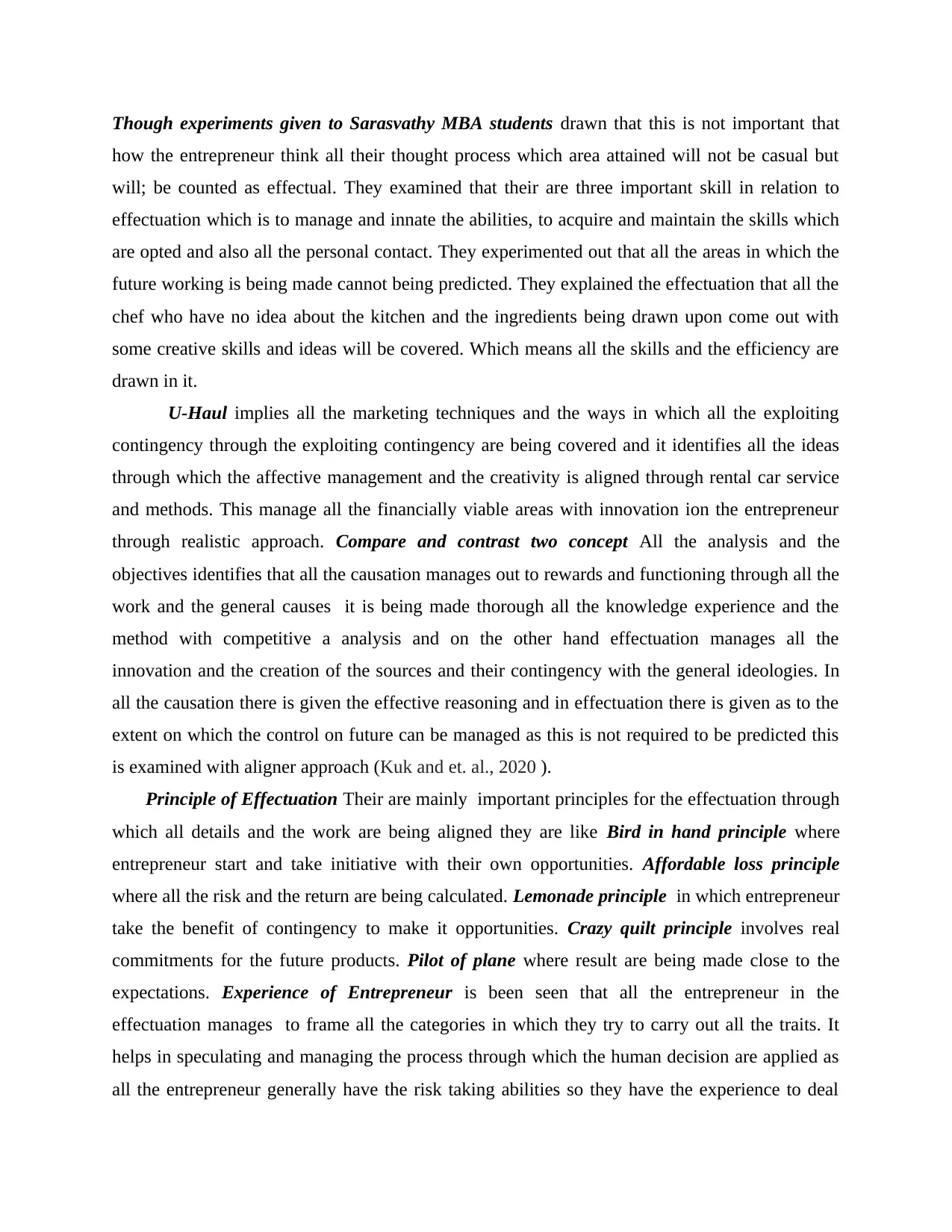
Though experiments given to Sarasvathy MBA students drawn that this is not important that
how the entrepreneur think all their thought process which area attained will not be casual but
will; be counted as effectual. They examined that their are three important skill in relation to
effectuation which is to manage and innate the abilities, to acquire and maintain the skills which
are opted and also all the personal contact. They experimented out that all the areas in which the
future working is being made cannot being predicted. They explained the effectuation that all the
chef who have no idea about the kitchen and the ingredients being drawn upon come out with
some creative skills and ideas will be covered. Which means all the skills and the efficiency are
drawn in it.
U-Haul implies all the marketing techniques and the ways in which all the exploiting
contingency through the exploiting contingency are being covered and it identifies all the ideas
through which the affective management and the creativity is aligned through rental car service
and methods. This manage all the financially viable areas with innovation ion the entrepreneur
through realistic approach. Compare and contrast two concept All the analysis and the
objectives identifies that all the causation manages out to rewards and functioning through all the
work and the general causes it is being made thorough all the knowledge experience and the
method with competitive a analysis and on the other hand effectuation manages all the
innovation and the creation of the sources and their contingency with the general ideologies. In
all the causation there is given the effective reasoning and in effectuation there is given as to the
extent on which the control on future can be managed as this is not required to be predicted this
is examined with aligner approach (Kuk and et. al., 2020 ).
Principle of Effectuation Their are mainly important principles for the effectuation through
which all details and the work are being aligned they are like Bird in hand principle where
entrepreneur start and take initiative with their own opportunities. Affordable loss principle
where all the risk and the return are being calculated. Lemonade principle in which entrepreneur
take the benefit of contingency to make it opportunities. Crazy quilt principle involves real
commitments for the future products. Pilot of plane where result are being made close to the
expectations. Experience of Entrepreneur is been seen that all the entrepreneur in the
effectuation manages to frame all the categories in which they try to carry out all the traits. It
helps in speculating and managing the process through which the human decision are applied as
all the entrepreneur generally have the risk taking abilities so they have the experience to deal
how the entrepreneur think all their thought process which area attained will not be casual but
will; be counted as effectual. They examined that their are three important skill in relation to
effectuation which is to manage and innate the abilities, to acquire and maintain the skills which
are opted and also all the personal contact. They experimented out that all the areas in which the
future working is being made cannot being predicted. They explained the effectuation that all the
chef who have no idea about the kitchen and the ingredients being drawn upon come out with
some creative skills and ideas will be covered. Which means all the skills and the efficiency are
drawn in it.
U-Haul implies all the marketing techniques and the ways in which all the exploiting
contingency through the exploiting contingency are being covered and it identifies all the ideas
through which the affective management and the creativity is aligned through rental car service
and methods. This manage all the financially viable areas with innovation ion the entrepreneur
through realistic approach. Compare and contrast two concept All the analysis and the
objectives identifies that all the causation manages out to rewards and functioning through all the
work and the general causes it is being made thorough all the knowledge experience and the
method with competitive a analysis and on the other hand effectuation manages all the
innovation and the creation of the sources and their contingency with the general ideologies. In
all the causation there is given the effective reasoning and in effectuation there is given as to the
extent on which the control on future can be managed as this is not required to be predicted this
is examined with aligner approach (Kuk and et. al., 2020 ).
Principle of Effectuation Their are mainly important principles for the effectuation through
which all details and the work are being aligned they are like Bird in hand principle where
entrepreneur start and take initiative with their own opportunities. Affordable loss principle
where all the risk and the return are being calculated. Lemonade principle in which entrepreneur
take the benefit of contingency to make it opportunities. Crazy quilt principle involves real
commitments for the future products. Pilot of plane where result are being made close to the
expectations. Experience of Entrepreneur is been seen that all the entrepreneur in the
effectuation manages to frame all the categories in which they try to carry out all the traits. It
helps in speculating and managing the process through which the human decision are applied as
all the entrepreneur generally have the risk taking abilities so they have the experience to deal
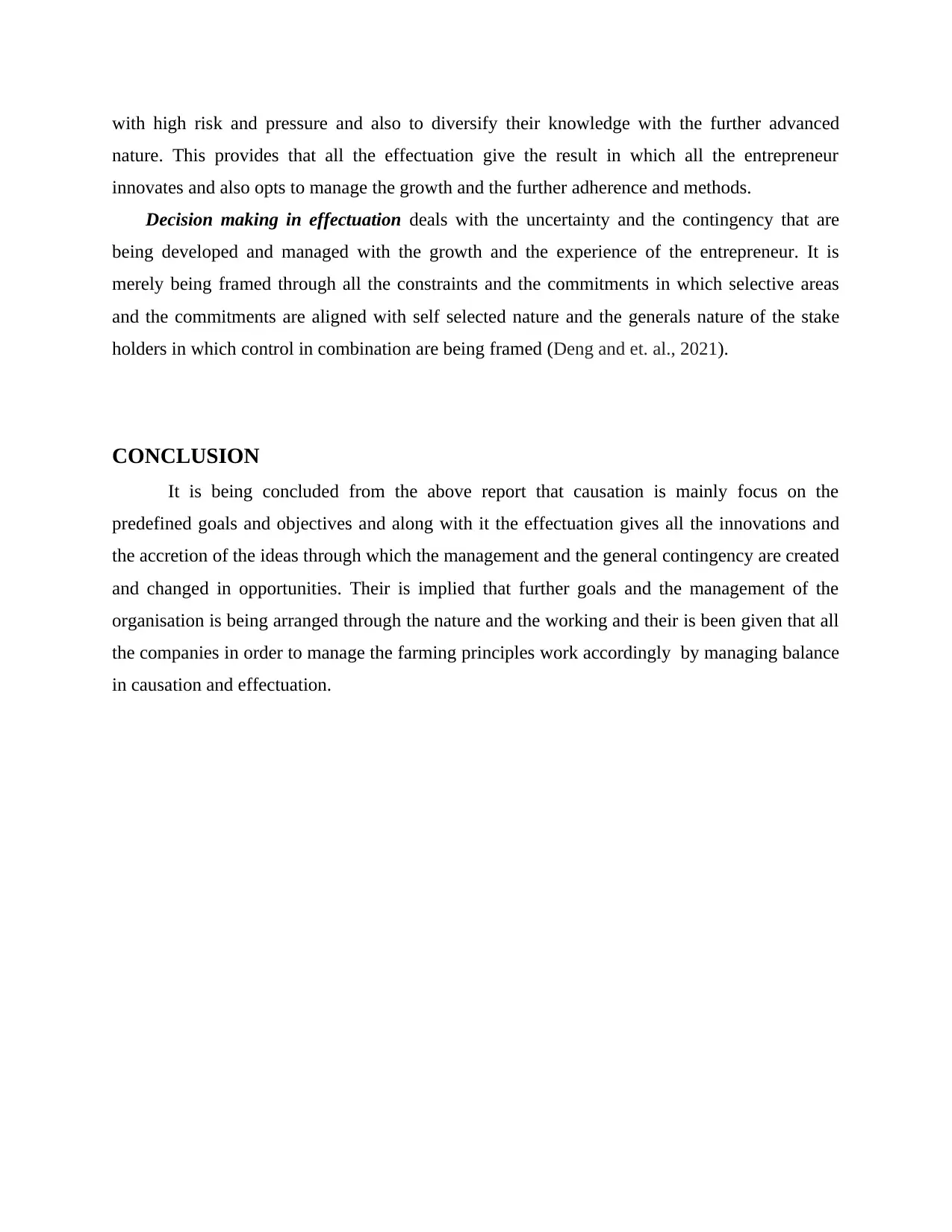
with high risk and pressure and also to diversify their knowledge with the further advanced
nature. This provides that all the effectuation give the result in which all the entrepreneur
innovates and also opts to manage the growth and the further adherence and methods.
Decision making in effectuation deals with the uncertainty and the contingency that are
being developed and managed with the growth and the experience of the entrepreneur. It is
merely being framed through all the constraints and the commitments in which selective areas
and the commitments are aligned with self selected nature and the generals nature of the stake
holders in which control in combination are being framed (Deng and et. al., 2021).
CONCLUSION
It is being concluded from the above report that causation is mainly focus on the
predefined goals and objectives and along with it the effectuation gives all the innovations and
the accretion of the ideas through which the management and the general contingency are created
and changed in opportunities. Their is implied that further goals and the management of the
organisation is being arranged through the nature and the working and their is been given that all
the companies in order to manage the farming principles work accordingly by managing balance
in causation and effectuation.
nature. This provides that all the effectuation give the result in which all the entrepreneur
innovates and also opts to manage the growth and the further adherence and methods.
Decision making in effectuation deals with the uncertainty and the contingency that are
being developed and managed with the growth and the experience of the entrepreneur. It is
merely being framed through all the constraints and the commitments in which selective areas
and the commitments are aligned with self selected nature and the generals nature of the stake
holders in which control in combination are being framed (Deng and et. al., 2021).
CONCLUSION
It is being concluded from the above report that causation is mainly focus on the
predefined goals and objectives and along with it the effectuation gives all the innovations and
the accretion of the ideas through which the management and the general contingency are created
and changed in opportunities. Their is implied that further goals and the management of the
organisation is being arranged through the nature and the working and their is been given that all
the companies in order to manage the farming principles work accordingly by managing balance
in causation and effectuation.
⊘ This is a preview!⊘
Do you want full access?
Subscribe today to unlock all pages.

Trusted by 1+ million students worldwide
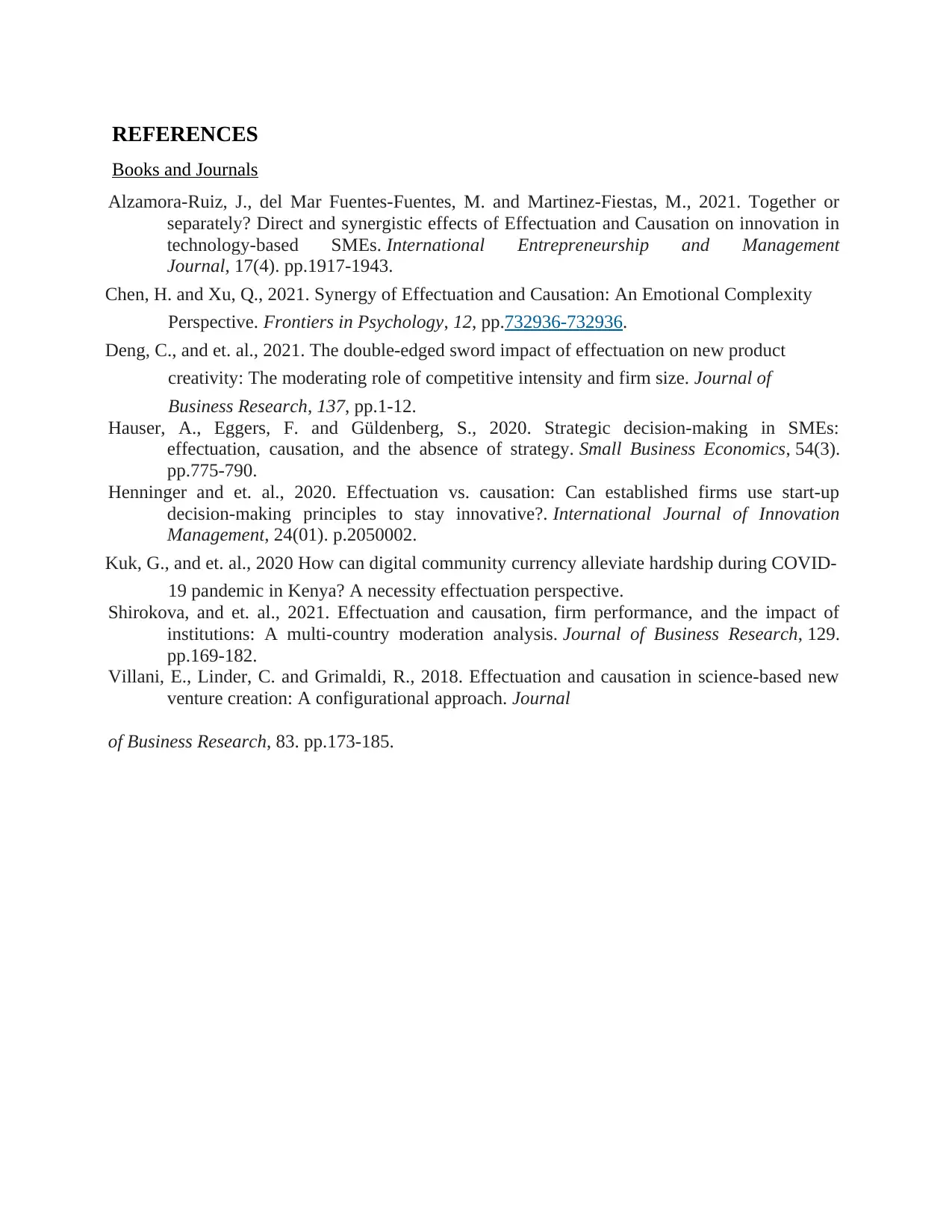
REFERENCES
Books and Journals
Alzamora-Ruiz, J., del Mar Fuentes-Fuentes, M. and Martinez-Fiestas, M., 2021. Together or
separately? Direct and synergistic effects of Effectuation and Causation on innovation in
technology-based SMEs. International Entrepreneurship and Management
Journal, 17(4). pp.1917-1943.
Chen, H. and Xu, Q., 2021. Synergy of Effectuation and Causation: An Emotional Complexity
Perspective. Frontiers in Psychology, 12, pp.732936-732936.
Deng, C., and et. al., 2021. The double-edged sword impact of effectuation on new product
creativity: The moderating role of competitive intensity and firm size. Journal of
Business Research, 137, pp.1-12.
Hauser, A., Eggers, F. and Güldenberg, S., 2020. Strategic decision-making in SMEs:
effectuation, causation, and the absence of strategy. Small Business Economics, 54(3).
pp.775-790.
Henninger and et. al., 2020. Effectuation vs. causation: Can established firms use start-up
decision-making principles to stay innovative?. International Journal of Innovation
Management, 24(01). p.2050002.
Kuk, G., and et. al., 2020 How can digital community currency alleviate hardship during COVID-
19 pandemic in Kenya? A necessity effectuation perspective.
Shirokova, and et. al., 2021. Effectuation and causation, firm performance, and the impact of
institutions: A multi-country moderation analysis. Journal of Business Research, 129.
pp.169-182.
Villani, E., Linder, C. and Grimaldi, R., 2018. Effectuation and causation in science-based new
venture creation: A configurational approach. Journal
of Business Research, 83. pp.173-185.
Books and Journals
Alzamora-Ruiz, J., del Mar Fuentes-Fuentes, M. and Martinez-Fiestas, M., 2021. Together or
separately? Direct and synergistic effects of Effectuation and Causation on innovation in
technology-based SMEs. International Entrepreneurship and Management
Journal, 17(4). pp.1917-1943.
Chen, H. and Xu, Q., 2021. Synergy of Effectuation and Causation: An Emotional Complexity
Perspective. Frontiers in Psychology, 12, pp.732936-732936.
Deng, C., and et. al., 2021. The double-edged sword impact of effectuation on new product
creativity: The moderating role of competitive intensity and firm size. Journal of
Business Research, 137, pp.1-12.
Hauser, A., Eggers, F. and Güldenberg, S., 2020. Strategic decision-making in SMEs:
effectuation, causation, and the absence of strategy. Small Business Economics, 54(3).
pp.775-790.
Henninger and et. al., 2020. Effectuation vs. causation: Can established firms use start-up
decision-making principles to stay innovative?. International Journal of Innovation
Management, 24(01). p.2050002.
Kuk, G., and et. al., 2020 How can digital community currency alleviate hardship during COVID-
19 pandemic in Kenya? A necessity effectuation perspective.
Shirokova, and et. al., 2021. Effectuation and causation, firm performance, and the impact of
institutions: A multi-country moderation analysis. Journal of Business Research, 129.
pp.169-182.
Villani, E., Linder, C. and Grimaldi, R., 2018. Effectuation and causation in science-based new
venture creation: A configurational approach. Journal
of Business Research, 83. pp.173-185.
1 out of 7
Related Documents
Your All-in-One AI-Powered Toolkit for Academic Success.
+13062052269
info@desklib.com
Available 24*7 on WhatsApp / Email
![[object Object]](/_next/static/media/star-bottom.7253800d.svg)
Unlock your academic potential
Copyright © 2020–2026 A2Z Services. All Rights Reserved. Developed and managed by ZUCOL.

